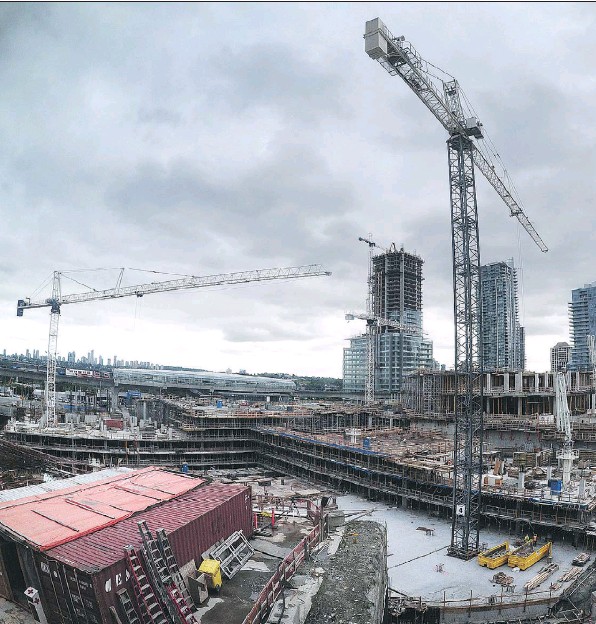DERRICK PENNER
The Vancouver Sun

For the first 11 months of 2016, Canada Mortgage and Housing Corporation has recorded 25,760 housing starts in Metro Vancouver. That?s expected to rise to 27,495 by the end of 2016, CMHC says. NICK PROCAYLO
The pace of construction of new housing in Metro Vancouver in 2016 has already smashed a record, with even more starts expected before the end of the year.
Metro Vancouver builders began construction of 2,651 housing units in November, the Canada Mortgage and Housing Corporation reported on Thursday, bringing the 2016 total to 25,760. That is projected to hit 27,495 by the end of the year.
And 2016 will be the first year in the past five in which housing starts have kept up with the growth in new households — families moving here or being set up here by young people.
While CHMC expects home construction will ease in 2017, it still expects a busy year, as continuing growth in households spurs relatively high levels of new construction, despite a slowing of the real estate market.
“Sometimes we have starts that are higher than household formations, then next year it will reverse,” said Robyn Adamache, CMHC’s principal market analyst for the region. “It’s kind of volatile that way, but I think it’s safe to say we are certainly not overbuilding.”
We expect the first six to nine months of 2017 to be near full-out production for most of our builders”
Figures for formation of households haven’t been reported for 2016. But Adamache said CMHC estimates that, in the past five years, there were 158,100 new families in Metro, but only 152,000 new homes built, a shortfall of 5,000 (this figure doesn’t count new homes built to replace ones that were demolished).
CMHC forecasts that Metro Vancouver housing starts will ease to between 21,500 and 23,500 in 2017 and to between 20,000 and 22,000 in 2018.
Adamache said the strength of B.C.’s job market supports housing starts remaining at relatively high levels.
In the first half of 2016, housing starts were partly driven by a lack of supply in Metro Vancouver’s frenzied resale housing market, Adamache said.
Now, the factors that have contributed to a slowing of re-sales across the region — such as the province’s 15-per-cent tax on foreign buyers, and changes in mortgage insurance rules that make it tougher for first-time buyers to qualify for loans — will influence demand for housing starts.
“The unknown is consumer sentiment,” Adamache said, “not only related to mortgage changes but just in general how consumer confidence is (faring).”
It takes some time for changes in sentiment to affect housing starts, many of which are planned long in advance and based on the advanced sale of unbuilt units, according to Robert de Wit, CEO of the Greater Vancouver Home Builders Association.
“We expect the first six to nine months of 2017 to be near full-out production for most of our builders,” de Wit said.
“(But) there is going to be a bit of cooling off,” de Wit said. “The consensus is that (construction) is going to slow down to the pace of two years ago.” But that’s still busy, he said.
Segments of Metro Vancouver’s property market are in “a bit of a staring contest,” said Michael Ferreira, managing principal of the research firm Urban Analytics, as buyers and sellers wait to gauge the impact the foreign buyers tax and mortgage changes have on prices.
Ferreira said prices on the new-construction side of the real-estate market appear to be hitting a ceiling, particularly in townhouse developments.
“Price escalation has slowed, if not stopped completely,” he said.
However, builders can respond quickly if they sense bigger changes in the market, said Tom Davidoff, an assistant professor in the Sauder School of Business at the University of B.C.
“If there was a crash, you’d see projects, even zoned projects, not (take out building) permits,” Davidoff said.
He said developers will likely slow down land purchases and rezoning activities first.
© 2017 Postmedia Network Inc.

